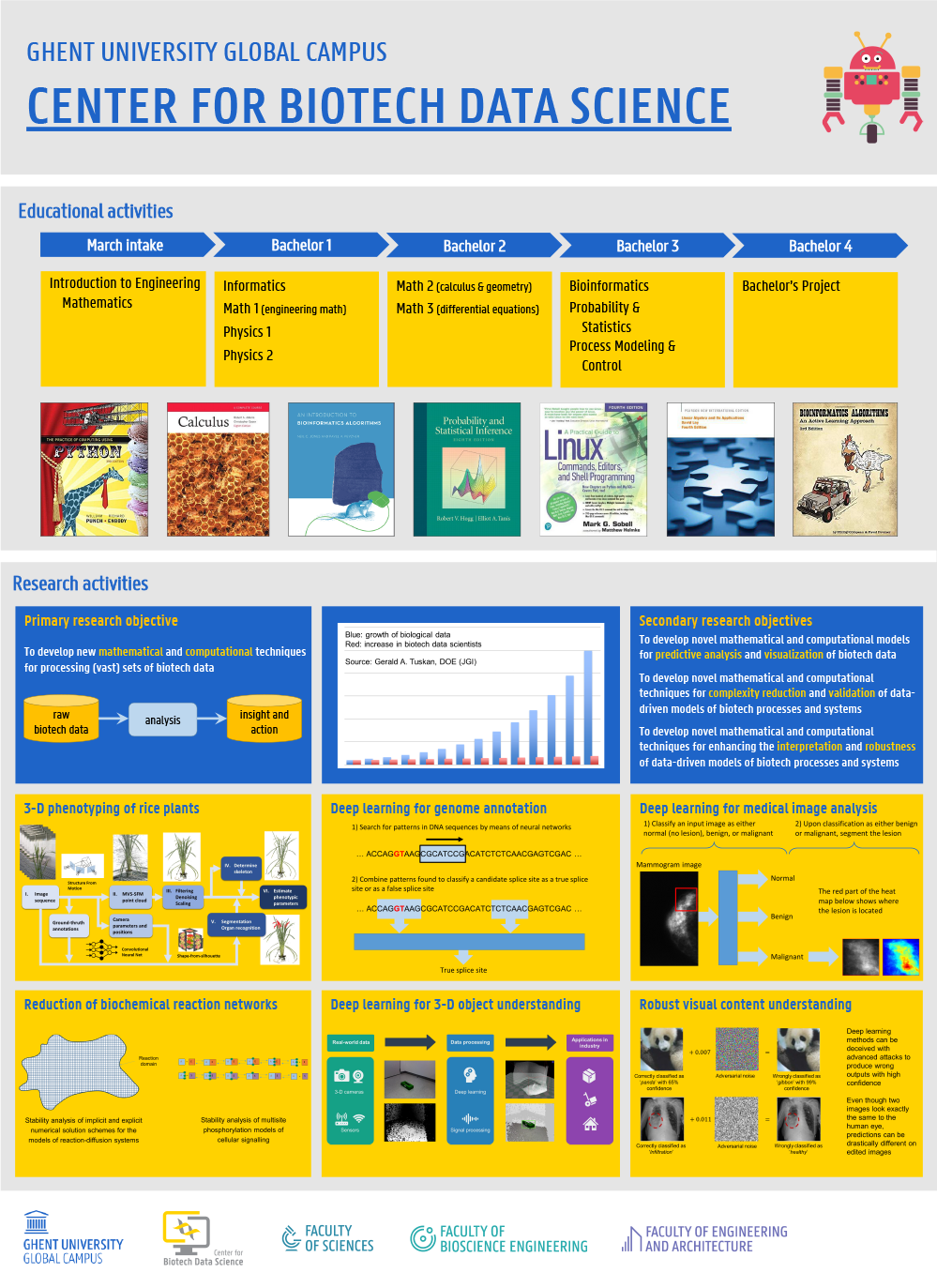Centre for Biosystems and Biotech Data Science
Visit Website 
Staff
- Prof. dr. Wesley De Neve
- Prof. dr. Shodhan Rao
- Prof. dr. Joris Vankerschaver
- Dr. Manvel Gasparyan
- Dr. Utku Ozbulak
- Dr. Homin Park
- Anju Susan Anish
- Esla Timothy Anzaku
- Seong Ik Choi
- Negin Harandi
- Espoir Kabanga
- Solha Kang
- Ju Hyung Lee
- Seyed Amir Mousavi
- Khoa Tuan Nguyen
- Jacobs Somnic
- Shivam Yadav
About Us

- predictive analysis and visualization of biotech data;
- complexity reduction and validation of data-driven models for biotechnical processes and systems; and
- interpretability and robustness of data-driven models for biotechnical processes and systems.
Useful links
Research
- stability, model reduction and parameter estimation of biochemical reaction networks;
- ecological species interaction networks and metapopulation models;
- validity conditions for quasi steady state approximations;
- representation learning for biological sequences;
- interpretability for biological sequence and biomedical image analysis;
- deep machine learning for structural and functional genome annotation;
- deep machine learning for 3-D object understanding;
- 3-D phenotyping of rice plants via computer vision and machine learning;
- uncertainty and out-of-distribution modeling for deep machine learning; and
- adversariality in deep machine learning.
Education
Mathematics 1: Engineering Mathematics (Ba1)
Mathematics 2: Multivariable Calculus and Geometry (Ba2)
Mathematics 3: Differential Equations (Ba2)
Physics 1 and 2: Mechanics, Vibration, Waves, and Thermodynamics (Ba1)
Informatics (Ba1)
This course teaches students how to describe time-consuming and repetitive tasks in such a way that they can be performed automatically by a (network-based) computer system. To that end, the necessary skills for computer-based creative problem solving will be acquired through learning to work and think in (1) Python, a popular programming language, and (2) in UNIX, the workhorse operating system of science and engineering. The computer problems that need to be solved are taken from different scientific disciplines, including mathematics, biology, chemistry, physics, and computer science.
Process Modelling and Control (Ba3)
Probability and Statistics (Ba3)
In this course, students are first introduced to probabilistic and statistical concepts. They learn to perform statistical techniques and to correctly describe and interpret statistical data and output. They also learn to distinguish between haphazard effects on the one hand and scientifically significant results on the other hand. Focus is also placed on critically reading and evaluating results presented in scientific literature.
The second part of the course continues where process modelling left off, namely with the simulation of dynamical (bio)systems. Different methodologies are discussed for model simulation, parameter estimation, and sensitivity analysis in order to come to a final model selection.
All theory is illustrated with ample examples. The statistical software R is used throughout the course.
Bioinformatics (Ba3 – major Molecular Biotechnology)
Primarily taking a computational point-of-view, this course aims at introducing students to the design, implementation, and analysis of standard algorithms in the field of bioinformatics, including exhaustive search algorithms, recursive algorithms, divide and-conquer algorithms, greedy algorithms, graph algorithms, dynamic programming algorithms, machine learning algorithms (shallow and deep), and randomized algorithms. These algorithms and related datastructures (e.g., lists, tuples, sets, dictionaries, graphs, hash tables, and trees) are studied in the context of problems like pattern matching, genome rearrangements, DNA sequencing, DNA sequence alignment, regulatory motif finding, genome annotation (structural and functional), and/or medical image analysis.
Bachelor dissertations
-
2019-2020
Yeji Bae – A Deep Learning Approach Towards Detecting and Locating Trypanosoma Parasites in Microscopy Images of Thick Blood Smears
Jongdo Im – Effects of Diffusion on the Coexistence of Species under Intransitive Competition
Taewoo Jung – Automatic Detection of Trypanosomosis in Thick Blood Smear Images Using Deep Learning
Hanul Kang – An Investigation of Class Activation Mapping for Visualizing Deep Learning-based Brain Tumor Classification
Younsoo Kang – Parameter Estimation for Chemical Reaction Networks from Experimental Data of Reaction Rates
Hayoung Kim – Automated Early Detection of Diabetic Retinopathy in Retinal Fundus Photographs using Deep Learning
Yunseol Park – Translation Initiation Site Prediction in Arabidopsis thaliana Using Synthetic Datasets and Black-box Models
Heesoo Song – Computer-aided Diagnosis of Trypanosomiasis Using Unstained Microscopy Images and Deep Machine Learning
-
2018-2019
Siho Han – Manual Feature Extraction and Extreme Gradient Boosting for Splice Site Detection
Jeongtek Kim – Generating synthetic genomic datasets for the validation of convolutional neural network models
Pyeong Eun Kim – Loss Function Visualization for Encoder-Decoder Style Deep Learning Models Targeting Biomedical Image Segmentation
Ju Hyung Lee – Deep learning for disease symptom segmentation in medical images
Woojin Lee – Computer Vision to Measure Cell Lengths in Rice Coleoptiles
-
2017-2018
Chananchida Sang-aram – Computer Vision in Plant Phenotyping: A Case Study for Automated Analysis of Rice Seedlings
Members
Tenured Academic Staff
- Wesley De Neve
- +82 32-626-4204 wesley.deneve@ghent.ac.kr
- Shodhan Rao
- +82 32-626-4203 shodhan.rao@ghent.ac.kr
- Joris Vankerschaver
- +82 32-626-4210 Joris.Vankerschaver@ghent.ac.kr
Assisting Academic Staff
- Manvel Gasparyan
- +82 32-626-4328 manvel.gasparyan@ghent.ac.kr
- Utku Ozbulak
- N/A utku.ozbulak@ghent.ac.kr
- Ho-Min Park
- +82 32-626-4326 homin.park@ghent.ac.kr
- Anju Susan Anish
- +82 32-626-4318 Anjususan.Anish@ghent.ac.kr
- Esla Timothy Anzaku
- +82 32-626-4319 eslatimothy.anzaku@ghent.ac.kr
- Seong Ik Choi
- N/A Seongik.Choi@UGent.be
- Negin Harandi
- +82 32-626-4301 negin.harandi@ghent.ac.kr
- Espoir Kabanga
- +82 32-626-4306 espoir.kabanga@ghent.ac.kr
- Solha Kang
- +82 32-626-4371 Solha.Kang@ghent.ac.kr
- Ju Hyung Lee
- N/A JuHyung.Lee@ghent.ac.kr
- Seyed Amir Mousavi
- +82 32-626-4304 amir.mousavi@ghent.ac.kr
- Khoa Tuan Nguyen
- +82 32-626-4330 KhoaTuan.Nguyen@ghent.ac.kr
- Negin Harandi
- +82 32-626-4317 negin.harandi@ghent.ac.kr
- Jacobs Somnic
- +82 32-626-4354 Jacobs.Somnic@ghent.ac.kr
- Shivam Yadav
- +82 32-626-4328 Shivam.Yadav@ghent.ac.kr
Former members
- Mijung Kim
- Breght Vandenberghe
- Bayer Crop Science
- Jasper Zuallaert
- Vlaams Instituut voor Biotechnologie (VIB)
- Arnout Van Messem
- University of Liege
- Surender Kumar
- Nathan Muyinda
- Makerere University, Kampala, Uganda
Contact details
Center director
- Shodhan Rao
Address
-
Ghent University Global Campus
#935, 119-5 Songdomunhwa-ro, Yeonsu-gu
Incheon 21985
South Korea

